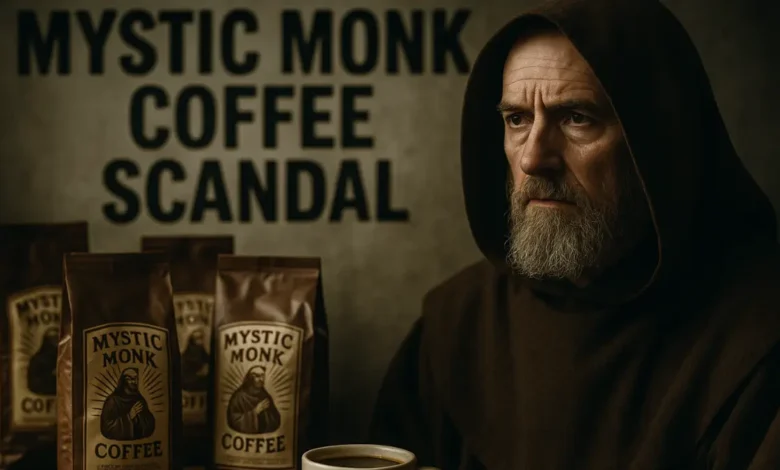Mystic Monk Coffee Scandal: The Untold Story of Faith, Business, and Controversy

Explore the mystic monk coffee scandal — a deep dive into how faith, ambition, and financial controversy collided. Discover the full story behind the brand that brewed devotion and dispute.
The Origins of Mystic Monk Coffee
Mystic Monk Coffee began as a spiritual dream nestled high in the Wyoming mountains. A small group of Carmelite monks sought to fund their monastery by selling something that aligned with both contemplation and community — coffee. It wasn’t just any coffee. It was positioned as divine inspiration in a cup, roasted by monks dedicated to prayer and purity.
The story appealed to thousands. Consumers weren’t just buying a morning beverage; they were supporting a vision — a holy pursuit of self-sufficiency wrapped in the comforting aroma of roasted beans. The monks appeared humble yet entrepreneurial, turning faith into commerce without losing the aura of sanctity. Mystic Monk Coffee quickly became a favorite among believers who wanted to sip devotion and make a difference.
However, as the brand grew, so did the questions. The allure of a religious mission intertwined with profit drew admiration and suspicion alike. Beneath the robes and rosaries, whispers of financial irregularities began to surface, leading to what would later be known as the mystic monk coffee scandal.
How a Monastic Dream Brewed Global Attention
The idea behind Mystic Monk Coffee was pure. Monks would roast premium beans and use the proceeds to build a monastery that could sustain their way of life. The marketing was compelling — images of peaceful monks surrounded by mountains, coffee beans gleaming in sacred sunlight, and the promise that each purchase supported a higher calling.
In an age of mass consumerism, the brand stood out as ethical, artisanal, and purpose-driven. It wasn’t just another coffee company; it was a movement of moral consumption. Bloggers, influencers, and religious media outlets hailed it as the perfect marriage of faith and business.
But success, even holy success, can breed complexity. Orders surged, expectations mounted, and soon the small community found itself managing logistics, marketing, and financial responsibilities far beyond monastic simplicity. This transformation from spiritual retreat to commercial enterprise became the crucible in which the mystic monk coffee scandal was forged.
The Allegations Behind the Mystic Monk Coffee Scandal
As Mystic Monk Coffee gained popularity, deeper scrutiny followed. What had begun as a story of faith-based entrepreneurship slowly turned into one marked by allegations of financial mismanagement, ethical inconsistencies, and deception.
One major point of criticism was transparency. Supporters claimed they were contributing to a spiritual cause — the construction of a monastery — yet questions arose over how the funds were being used. Critics accused the leadership of redirecting money toward unrelated property purchases and questionable investments. Some alleged that profits intended for the monastery’s expansion instead financed a lavish estate that contradicted vows of poverty and humility.
Another controversy involved authenticity. Many buyers believed the coffee was roasted entirely by the monks within their monastery walls. But reports suggested that at least part of the roasting process was outsourced to commercial facilities, contradicting the brand’s carefully crafted narrative. To loyal followers, this was more than misleading advertising — it felt like a betrayal of sacred trust.
The mystic monk coffee scandal thus became a cautionary tale of what happens when spiritual branding collides with commercial ambition.
Faith, Fundraising, and Financial Confusion
Mystic Monk Coffee operated under the banner of religious devotion, and this moral authority made people generous. Donors and buyers alike felt secure knowing their money furthered divine work. But as investigations surfaced, financial clarity became elusive.
Documents and insider testimonies suggested that some funds were being allocated toward ventures unrelated to the monastery’s construction. The monks’ purchase of a multimillion-dollar ranch, for instance, raised eyebrows. Was it truly for the monastery’s expansion, or an ambitious real-estate venture cloaked in sanctity?
The lack of transparent accounting amplified skepticism. Even supporters who once saw Mystic Monk Coffee as a beacon of ethical business began to question whether faith had become a marketing tool. The mystic monk coffee scandal exposed the fragile line between divine mission and material temptation — a reminder that even well-intentioned projects can lose their moral compass when money enters the mix.
The Marketing Miracle That Turned Controversial
From a branding perspective, Mystic Monk Coffee was a masterclass in storytelling. Its appeal wasn’t merely the coffee’s taste but the symbolism it carried. Each bag promised a spiritual connection — a way to support monks in prayer with every morning brew.
Yet this powerful narrative became a double-edged sword. When the scandal broke, that very authenticity became its downfall. Critics argued that the marketing had manipulated consumers’ faith, creating an illusion of monastic purity while operating with commercial motives.
The website’s descriptions, the images of monks roasting coffee, and the consistent appeal to moral virtue became the focus of investigation. Were these depictions accurate reflections or exaggerated branding tactics? As these questions multiplied, public trust began to decline. The mystic monk coffee scandal was not merely about financial misuse — it became an indictment of religious marketing ethics.
The Public’s Reaction to the Scandal
When the news of the mystic monk coffee scandal spread, reactions varied across communities. Devout Catholics felt heartbroken. Many who had supported the monks financially expressed a sense of betrayal. They believed in the purity of intention and now faced the painful possibility that their donations had been misused.
Others viewed the scandal as inevitable. They argued that once a monastic order enters the world of commerce, it exposes itself to the same temptations that plague any business — greed, competition, and a loss of focus. For some, Mystic Monk Coffee became a symbol of what happens when spirituality and capitalism blur.
Still, a portion of loyal supporters defended the monks, suggesting that mismanagement does not equate to malice. They emphasized the brand’s quality coffee and the monks’ original sincerity, urging forgiveness and reform rather than condemnation.
Media Coverage and Investigative Reports
Mainstream and religious media outlets dove deep into the story. Articles dissected the monks’ financial operations, interviews revealed conflicting testimonies, and analysts debated the moral implications of monetizing faith.
Television segments, blogs, and YouTube exposés carried headlines linking the monks to the broader conversation about ethics in religious enterprises. The coverage painted contrasting images — on one hand, devout men striving to build a sustainable monastery; on the other, a business cloaked in piety yet fueled by commercial ambition.
This wave of media attention transformed Mystic Monk Coffee from a niche brand into a household name — but for the wrong reasons. Ironically, the scandal made it more famous than any marketing campaign ever could.
Ethical Reflections on the Mystic Monk Coffee Scandal
The heart of the scandal is not merely about coffee or money. It’s about integrity. Mystic Monk Coffee started with a noble vision but became an example of how even virtuous intentions can be tainted when transparency fades.
The episode forces us to reflect on accountability within faith-based ventures. When a brand ties itself to moral or spiritual credibility, its ethical standards must be higher than average. Consumers place deeper trust in such enterprises, believing they operate with divine sincerity.
The mystic monk coffee scandal reminds the world that good intentions cannot excuse ethical oversights. Whether a company is secular or sacred, honesty remains non-negotiable.
Impact on Faith-Based Entrepreneurship
In the wake of the scandal, other religious and charitable enterprises faced increased scrutiny. Donors began asking tougher questions: Where is my money going? How do I know this purchase truly supports the cause it claims?
Mystic Monk Coffee inadvertently changed the landscape of faith-based commerce. It served as both a warning and a learning moment. The incident taught entrepreneurs that blending spirituality with business requires unwavering transparency and humility. Without it, even a well-intentioned mission can spiral into mistrust.
For many religious communities, the mystic monk coffee scandal became a turning point — a sobering lesson that devotion and profit must remain in delicate balance.
A Look Inside the Monastic Business Model
The model that powered Mystic Monk Coffee was simple yet brilliant. A monastery roasts and sells coffee; profits fund religious expansion. It appealed to modern consumers seeking purpose behind their purchases. But that simplicity masked logistical and ethical complexities.
Monks are not trained businessmen. Managing supply chains, marketing strategies, and tax compliance isn’t part of monastic life. When success arrived, the monks suddenly found themselves thrust into a commercial world they barely understood. Outsourcing became necessary, profit margins needed managing, and soon the purity of the original mission blurred.
The mystic monk coffee scandal can thus be seen as a cautionary tale about overextension — when spiritual communities venture into commercial realms without adequate oversight or expertise, the result can be moral and financial confusion.
Consumer Trust and Brand Redemption
Rebuilding trust after a moral scandal is a daunting task. Mystic Monk Coffee’s leadership attempted damage control through statements emphasizing spiritual renewal and recommitment to transparency. They clarified their mission, adjusted operations, and sought forgiveness from supporters.
While some consumers returned, others never did. Trust, once lost, is difficult to restore — especially when rooted in moral expectations. Yet over time, the brand continued to sell coffee, albeit with less fanfare. Some loyalists argued that the company’s survival itself was proof of divine forgiveness. Others saw it as unfinished business in the ongoing dialogue between faith and commerce.
Lessons Learned from the Mystic Monk Coffee Scandal
Every scandal carries lessons. For religious enterprises, Mystic Monk Coffee offers several:
- Transparency must never be optional.
- Marketing should reflect truth, not idealized imagery.
- Faith-based branding carries added moral weight.
- Accountability systems should match the scale of ambition.
These lessons extend beyond monasteries to nonprofits, churches, and all mission-driven businesses. The world today values authenticity above all. The mystic monk coffee scandal revealed that even spiritual ventures must meet that standard to thrive.
Public Perception and Long-Term Consequences
The scandal left a deep mark on public perception. What was once seen as an inspiring example of holy entrepreneurship became a symbol of misplaced faith in branding. For some, Mystic Monk Coffee still evokes admiration for its creativity. For others, it represents a fall from grace — a parable of modern religious capitalism.
Despite the controversy, the monks continue their spiritual practice. They roast, they pray, and they rebuild their reputation cup by cup. Whether they succeed or not, the narrative of the mystic monk coffee scandal will remain a fixture in discussions of faith, integrity, and enterprise for years to come.
Table: Contrasting the Ideal vs. Reality
| Aspect | Ideal Vision | Reality Revealed |
|---|---|---|
| Purpose | Build monastery through ethical sales | Fund misallocated and unclear purchases |
| Production | Coffee roasted solely by monks | Outsourced roasting for demand |
| Marketing | Honest spiritual branding | Overstated claims of monastic labor |
| Financial Oversight | Transparent and accountable | Opaque spending and limited disclosure |
| Public Impact | Inspired global support | Sparked ethical debate and scrutiny |
Quotes Reflecting the Scandal’s Essence
“Faith and finance must never compete for the same heart.”
— Anonymous former supporter
“The mystic monk coffee scandal isn’t about coffee; it’s about trust brewed and broken.”
— Religious business ethicist
“When holiness becomes a brand, every misstep becomes a headline.”
— Editorial commentary
Frequently Asked Questions
What was the mystic monk coffee scandal about?
The mystic monk coffee scandal refers to the controversy involving the Carmelite monks of Wyoming and their coffee business, Mystic Monk Coffee. Allegations included misuse of funds, lack of transparency, and misleading marketing about the coffee’s production and purpose.
Was Mystic Monk Coffee shut down?
No. The company continued operations despite public backlash. However, it faced reduced credibility and sales after the revelations surrounding its financial and ethical conduct.
Did the monks personally profit from Mystic Monk Coffee?
While evidence suggests funds were used in questionable ways, direct personal enrichment remains unclear. The issue centered on mismanagement and misallocation of funds rather than overt embezzlement.
Is Mystic Monk Coffee still operating today?
Yes, Mystic Monk Coffee still sells products online. The brand has attempted to restore trust by emphasizing ethical sourcing and renewed spiritual mission.
What lessons does the mystic monk coffee scandal teach?
It teaches the importance of transparency, accountability, and honesty in mission-driven enterprises. Even good intentions can lead astray when financial oversight fails.
Conclusion
The mystic monk coffee scandal serves as both a revelation and a reminder. It exposes how even the most spiritual of pursuits can falter under the weight of money and ambition. Yet it also reminds us that failure can lead to reform, reflection, and renewal.
Mystic Monk Coffee’s story continues — not as a tale of greed, but as a meditation on human imperfection. In every scandal lies an opportunity to rebuild what was lost, to brew something purer from the bitter grounds of experience.





